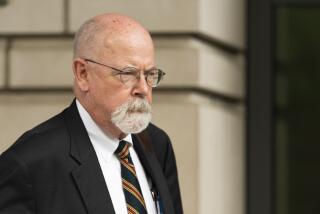Patriot Act Praised in Report
- Share via
WASHINGTON — Last year, the case of Hedwig Braun attracted national attention after the elderly woman was kidnapped and held for ransom in a tiny, unheated shack in Wisconsin in the dead of winter.
Now, the Justice Department is holding up the rescue of the 88-year-old grandmother for another reason -- as a success story in the use of the USA Patriot Act.
The tale was one of several unlikely cases -- another entailed a suspected terrorist plot aimed at the South Pole -- cited in a report released Tuesday by Atty. Gen. John Ashcroft.
The upbeat analysis, titled “Report From the Field: The USA Patriot Act at Work,” is part of a campaign by the Justice Department and House Republicans to shore up support for the controversial law, which narrowly survived an assault on some of its provisions in Congress last week.
“The report that we are releasing today provides a mountain of evidence that the Patriot Act continues to save lives,” Ashcroft said at a news conference on Capitol Hill.
Ashcroft said the report, which is not required under the act, was compiled at the request of members of Congress from both parties.
But some House and Senate Democrats assailed the analysis as one-sided and misleading, saying it failed to address the most contentious provisions of the law and perpetrated myths about the department’s terrorism-fighting record.
“This report is more of John Ashcroft’s doubletalk on the Patriot Act,” said Rep. John Conyers Jr. of Michigan, the top Democrat on the House Judiciary Committee.
The American Civil Liberties Union, which has challenged portions of the Patriot Act in court, branded the report part of a “public relations” campaign by the Bush administration.
The release of the document comes as the administration’s record on fighting terrorism -- viewed as an asset in the president’s reelection bid -- has been catching heat in the courts.
And just last week, the House nearly scaled back a hotly debated section of the law that gave the government new powers to obtain information from libraries and bookstores about individuals’ reading habits.
Last year, Ashcroft declassified information showing that the reading-habits provision had not been used. He has declined to provide updated information, citing national security concerns.
Ashcroft denied any political motive behind the report. Republicans defended it, saying that the act’s opponents had been selective in the information they had used in an attempt to undermine the law.
“The people who criticize the Patriot Act cherry-pick their contentions the same way,” said Rep. F. James Sensenbrenner Jr. (R-Wis.), the House Judiciary Committee chairman, who attended the news conference with Ashcroft.
“To say that the Justice Department should not be able to release a report of success stories is making the debate a bit one-sided,” he added.
Ashcroft defended the tenor of the report, saying that “while there have been people who have raised issues about the Patriot Act, there is yet to be a case of any abuse of the Patriot Act that’s been brought to my attention.”
The act, passed just six weeks after the Sept. 11, 2001, attacks, made it easier for criminal investigators and intelligence agents in terror cases to share information, as well as to conduct physical and electronic surveillance.
The report found that the information-sharing provisions had been essential in several high-profile cases, including the disruption of alleged terror cells in Lackawanna, N.Y., and Portland, Ore., where the government has secured guilty pleas.
Other provisions of the law have been used to prosecute an unlicensed money broker in New Jersey accused of bankrolling an arms dealer, and to help authorities uncover terrorism hoaxes, including a 2002 case in which the defendant had sent more than 200 threatening letters laced with white powder to government agencies in Louisiana.
But the analysis also glosses over some rough patches in how the law has worked in practice.
It asserts that more than 310 defendants have been charged in connection with terrorism investigations since the Sept. 11 attacks. Civil liberties groups say many of the prosecutions were for immigration offenses involving people who even the government has acknowledged had no terrorist leanings.
The report also praises provisions of the act that make it easier for the government to prosecute individuals for providing “material support” to terrorists -- but it declines to note that a federal judge in California has declared that portion of the law to be unconstitutional.
The report also omits some of the government’s defeats in the courts. Last month, an Idaho jury acquitted a University of Idaho computer student accused of using the Internet to support terrorism. The student, who said he was simply exercising his 1st Amendment rights, had been jailed for 16 months.
Ashcroft said at the news conference that he did not consider the prosecution to be an abuse.
“The mere fact that some people are sometimes found innocent doesn’t indicate that there has been an abuse in the system; it means that the system operates successfully and it operates in freedom,” he said.
The report also detailed that the terrorism-fighting law had been used in numerous cases that had nothing to do with terrorism -- including investigations of potential bomb attacks on schools, computer hackers and child pornography.
A provision of the law allowing the government easier access to records of Internet service providers was used last year to resolve threats by a hacker against the main computer server operated by the National Science Foundation at the South Pole Research Station, the report found.
The same provision, among others, helped locate Braun, the Wisconsin octogenarian who was kidnapped in February 2003 from her home. Her abductor demanded $3 million for her return.
Without identifying Braun by name, the Justice Department report said the law facilitated gathering information that helped identify suspects and the location where she was found.
“She’s alive today because of the Patriot Act,” Sensenbrenner declared.
“And the people who kidnapped her are in jail today because of the Patriot Act.”
More to Read
Get the L.A. Times Politics newsletter
Deeply reported insights into legislation, politics and policy from Sacramento, Washington and beyond. In your inbox twice per week.
You may occasionally receive promotional content from the Los Angeles Times.










